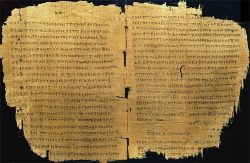"The Purest Gospel" -- Romans 1:16-17
 Wednesday, March 18, 2009 at 09:23AM
Wednesday, March 18, 2009 at 09:23AM  The Thirty-Eighth (and last) in a Series of Sermons on Paul's Epistle to the Romans
The Thirty-Eighth (and last) in a Series of Sermons on Paul's Epistle to the Romans
Martin Luther once described Paul’s letter to the church in Rome as “the purest gospel.” We have spent 37 Sundays going through this amazing epistle, and I thought that it would be appropriate to devote one final sermon to summarizing some of the things Paul has set forth in this letter.
One of the problems with a week by week study of a lengthy book such as Romans is that we can easily miss the big picture since it takes so many weeks to cover the entire book. Paul’s intent was that this letter be read in the various house churches we speak of as the “church in Rome.” Since this letter was originally intended to be read aloud in these various congregations, I can’t help but think Paul would chuckle a bit were he to learn that a congregation such as ours would spend so much time going through a letter which he intended to be read aloud in one sitting. And yet this letter is so profound and so densely-packed with important doctrinal matters, I think a good case can be made that we went through this letter far too quickly. So, a quick summary of several of the major themes of Romans should be a profitable undertaking and a fitting way to end our series.
Our fathers in the faith clearly understood the importance of the Book of Romans and we would be foolish to ignore their wise counsel. Luther thought understanding Romans so important to a healthy Christian life that he thought it should be memorized by every Christian. He also stated that Romans cannot be studied enough or too thoroughly. John Calvin thought that the Book of Romans was the key to understanding the whole of Scripture, since in this epistle Paul quotes more verses from the Old Testament than any other book of the New Testament. If we understand the Book Romans, says Calvin, we will be able to see the big picture of the redemptive drama so that we can make sense of details and understand the more obscure passages of the Bible. A number of writers have made the point that Romans has an uncanny power to bring life to Christ’s church whenever the church is in need of Reformation and renewal. But then the church always seems to be in need of Reformation and renewal.
Then there is the fact that many of the issues facing the church in Rome are issues which have re-surfaced in our own day. Just like the ancient Romans, Americans do not embrace the biblical conception of human sin and God’s grace. For Paul, true religion is based upon understanding God’s revelation of himself in the person of Jesus Christ, the central figure in our deliverance from sin, who is revealed on every page in the unfolding drama of the redemption. This why Paul cites so many Old Testament passages even though the messianic age has now dawned and the Old Testament promise of a redeemer is fulfilled. Much like ancient Roman pagans, modern Americans think they can find salvation by looking within. Paul’s letter to the church in Rome reminds us that this is not the case. If we look within for salvation we will only find sin and depravity.
To read the rest of this sermon, click here


Reader Comments (4)
It works for me . . . Have you updated your adobe PDF reader?